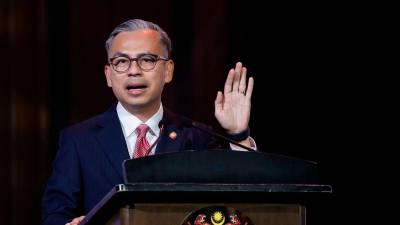KUALA LUMPUR: The Malaysian Communications and Multimedia Commission (MCMC) will lead a delegation to Singapore next week for technical discussions with international social media platforms about mechanisms to curb cybercrime.
Communications Minister Datuk Fahmi Fadzil said the talks will focus on implementing electronic Know-Your-Customer (eKYC) identity verification using MyKad, passport, or MyDigital ID to prevent criminals from misusing these platforms.
He explained that the goal is to stop criminals from exploiting digital platforms for fake sales, prohibited items like narcotics, and scams, which occur frequently on platforms such as Facebook.
Fahmi revealed that over 150,000 online gambling and fraud-related content pieces were recorded on Facebook in the first nine months of this year.
He noted that it takes 30 minutes to remove each piece of content, which he described as a significant waste of time.
The minister stated that criminals are exploiting Malaysia’s fast and affordable internet access to trap victims through false advertising of non-existent products, promotion of banned substances, and various scams.
Fahmi highlighted that the most common case of impersonation involves ophthalmologist Prof Datuk Dr Muhaya Mohamad, whose name has been used by fake accounts selling counterfeit products for the past two years.
He announced that the Online Safety Act (ONSA) will be enforced by the end of this year, making it compulsory for social media platforms to take comprehensive action against harmful online content.
Fahmi clarified that the online safety committee under the Prime Minister’s Department will issue instructions, while MCMC will carry out enforcement, with one objective being to ensure children under 13 do not have social media accounts.
Earlier in his speech, Fahmi urged civil servants to strengthen their mental resilience and adopt the ‘Zero Trust’ principle to navigate the infodemic era while leveraging artificial intelligence to reduce workloads and combat fake news.
He stressed that anyone, including national figures, can fall victim to misinformation and cyber fraud in today’s information ecosystem, necessitating a comprehensive culture of information verification within the civil service.
Regarding psychological risks, Fahmi described internal screening data as sobering, revealing that 1.17 million civil servants have undergone Psychological Health Digital Profiling (MyPsyD).
He reported that five percent of those profiled were identified as being at high risk for mental health issues, while another 35 percent were at moderate risk.
Fahmi urged organisational leadership to be more sensitive, provide reasonable working space, and foster mutual support within teams.
He reminded civil servants to maintain discipline when using social media platforms.
The 29th Public Service Psychology Conference, launched today, focuses on AI’s role as a complement to human thinking and efforts to strengthen the mental resilience of civil servants during the infodemic era. – Bernama
